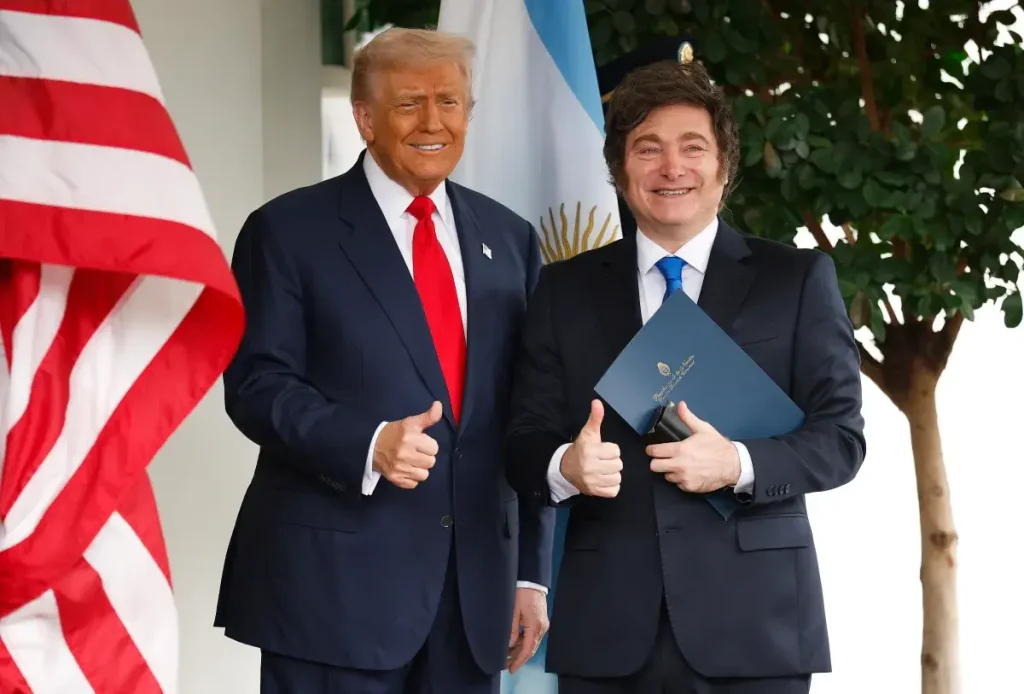Trump’s Argentinian Beef Plan Stirs Controversy Amid Inflation Concerns
In a move that has sparked significant backlash from American farmers and political allies alike, President Donald Trump recently announced plans to import beef from Argentina as part of his strategy to combat rising food prices in the United States. Speaking to reporters aboard Air Force One, Trump explained his reasoning: “We would buy some beef from Argentina. If we do that, that will bring our beef prices down.” This statement comes at a time when beef prices have soared dramatically in the U.S., with the Department of Labor reporting a 13.9 percent increase in the beef and veal index over the 12 months leading to August, and uncooked beef steaks specifically rising by 16.6 percent. The price surge has been attributed to multiple factors, including screwworm outbreaks weakening already diminished cattle herds, alongside drought conditions that have stressed the domestic supply chain. Trump, acutely aware that inflation was a key issue that helped deliver him the White House in the 2024 election, appears determined to address these rising costs before they potentially impact next year’s midterm elections.
However, the announcement has not been well-received by American beef producers, with Wyoming-based Meriwether Farms publicly denouncing the plan as “an absolute betrayal to the American cattle rancher.” Despite expressing support for Trump overall, the company articulated the concerns of many domestic producers in a pointed social media post: “We love you and support you—but your suggestion to buy beef from Argentina to stabilize beef prices would be an absolute betrayal to the American cattle rancher.” The beef producer acknowledged the reality of high prices but argued that the solution shouldn’t come at the expense of domestic ranchers. Meriwether Farms placed blame on “politicians who have allowed BRICS-aligned entities to dominate the meat industry, that participate in price fixing and who also continually lie to their consumers.” According to their statement, Washington has facilitated “the squeezing of our own ranchers” for decades, “while allowing these entities to flood the market with cheaper, lower-quality imports.”
The timing of Trump’s announcement has raised additional questions, as it follows closely behind the Trump administration’s controversial $20 billion bailout of Argentina. This financial rescue package, announced by Treasury Secretary Scott Bessent after Argentine President Javier Milei’s party suffered a significant electoral defeat, was designed to stabilize the country’s currency market. The bailout itself has attracted criticism from both sides of the political aisle, with some Democrats and Republicans questioning why such substantial financial support was being directed abroad rather than toward domestic concerns. Representative Marjorie Taylor Greene, a Georgia Republican typically aligned with Trump’s policies, openly challenged the decision on social media: “Americans are getting decimated with high cost of living and skyrocketing insurance costs. Many of them have zero savings and some are maxing out credit cards to survive. Tell me how it’s America First to bailout a foreign country with $20 or even $40 BILLION taxpayer dollars.”
The beef import proposal has catalyzed a broader conversation about Trump’s “America First” policy framework and its practical application in trade and international relations. Critics have seized on what they perceive as an inconsistency between the president’s campaign rhetoric and his administration’s actions. Christopher Gibbs, a farmer and chair of the Shelby County Democratic Party in Ohio, sarcastically remarked on social media: “Guess when you get tired of bending over soybean growers, you can move on to cattle ranchers.” Spencer Hakimian, founder of Tolou Capital Management, framed the issue as a double blow: “Our own farmers go bankrupt and lose everything. Argentina gets another bailout.” Even liberal commentator Matthew Yglesias weighed in with apparent sarcasm: “America First. Amazing.” These critiques highlight the tension between Trump’s stated commitment to prioritizing American industries and his administration’s apparent willingness to pursue international economic strategies that some domestic producers view as harmful to their interests.
Industry representatives have also expressed concern about the potential market disruption that could result from such policy interventions. Justin Tupper, president of the U.S. Cattlemen’s Association, cautioned in a press release that “when policymakers hint at intervention or suggest quick fixes, they can shake the market’s foundation and directly impact the livelihoods of ranchers who depend on stable, transparent pricing.” He emphasized that “sudden price moves make it harder for independent producers to plan, invest, and keep their operations running.” This perspective underscores the complex balance required in addressing consumer concerns about high prices while also protecting the long-term viability of domestic agricultural production. The beef industry, already grappling with environmental challenges and market pressures, views government intervention in international trade as potentially destabilizing to an already precarious situation.
Trump, for his part, has framed the potential beef imports as a targeted intervention rather than a wholesale shift in trade policy. In his comments to reporters, he emphasized: “I’m not talking about that much—from Argentina, it would help Argentina, which we consider a very good country, a very good ally in a place.” He also contextualized the move within a broader geopolitical framework, suggesting that South American countries are “starting to turn very much toward us. They’re getting away from socialism, and you can go right down the pack.” This framing attempts to position the beef import plan as serving both domestic economic goals and foreign policy objectives—supporting a key ally while addressing inflation concerns at home. As Argentina approaches midterm elections on October 26, where President Milei’s cost-cutting, free-market reform agenda will face a significant test, the Trump administration’s economic support could be viewed as an attempt to bolster a politically aligned government in a region where U.S. influence has historically competed with socialist movements.
As the situation continues to develop, several questions remain unanswered about the specifics of Trump’s beef import proposal. The president did not specify the volume of beef that would be imported under the potential deal, leaving uncertainty about the scale of the intervention and its potential impact on both domestic markets and consumer prices. The announcement has clearly touched a nerve among American agricultural producers, who feel caught between acknowledging the reality of high consumer prices and protecting their own economic interests. Meriwether Farms articulated this frustration pointedly in another social media post: “Why is it that members of Congress, Cabinet Secretaries, and other senior government officials continue to call farmers and ranchers the ‘backbone of the country’ while simultaneously screwing them with disastrous policy decisions? Do they even believe what they are saying or do they think we are stupid?” This sentiment captures the challenging position of American farmers navigating between their traditional political alignments and their economic self-interest—a tension that will likely continue to shape agricultural policy debates throughout Trump’s term and into the upcoming midterm elections.













